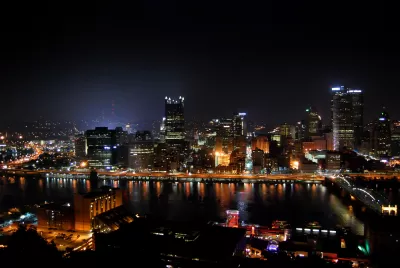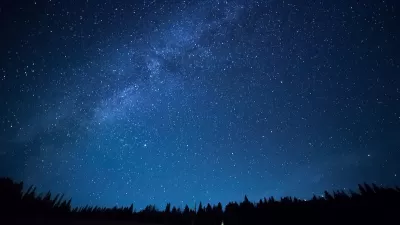As evidence showing the benefits of dark skies builds, Pittsburgh becomes the first eastern American city to enact a dark sky policy.

Pittsburgh became the first city in the eastern U.S. to adopt a 'dark sky' policy, reports Josyana Joshua, " meaning that it will switch to lower wattage LED bulbs and add shades along bridges, roads and other public areas" to reduce light pollution and energy use from public lighting.
Although it joins 34 other 'dark sky' communities that have committed to reduced lighting guidelines, "Pittsburgh will be the first city in the world to follow the International Dark Sky Association’s new values-centered outdoor lighting, which means it will follow the group’s more comprehensive suggestions surrounding wattage and color temperature as well as when and how to keep lights on." Dark sky advocates say light pollution disrupts ecosystems and natural processes that depend on light cues, writes Joshua. "It can also confuse the natural 24 hour day/night cycle for humans — a darker sky has been found to have positive effects on mental health, with stargazing and less blue light playing a part."
Despite concerns about safety, research from England and Wales shows that street lighting reductions did not negatively affect crime or car crash rates. Since Pittsburgh's announcement, other eastern cities and states have pushed forward dark sky initiatives of their own.
FULL STORY: Why Pittsburgh Is Dimming Its Streetlights

Trump Administration Could Effectively End Housing Voucher Program
Federal officials are eyeing major cuts to the Section 8 program that helps millions of low-income households pay rent.

Planetizen Federal Action Tracker
A weekly monitor of how Trump’s orders and actions are impacting planners and planning in America.

Ken Jennings Launches Transit Web Series
The Jeopardy champ wants you to ride public transit.

California Invests Additional $5M in Electric School Buses
The state wants to electrify all of its school bus fleets by 2035.

Austin Launches $2M Homelessness Prevention Fund
A new grant program from the city’s Homeless Strategy Office will fund rental assistance and supportive services.

Alabama School Forestry Initiative Brings Trees to Schoolyards
Trees can improve physical and mental health for students and commnity members.
Urban Design for Planners 1: Software Tools
This six-course series explores essential urban design concepts using open source software and equips planners with the tools they need to participate fully in the urban design process.
Planning for Universal Design
Learn the tools for implementing Universal Design in planning regulations.
Ada County Highway District
Clanton & Associates, Inc.
Jessamine County Fiscal Court
Institute for Housing and Urban Development Studies (IHS)
City of Grandview
Harvard GSD Executive Education
Toledo-Lucas County Plan Commissions
Salt Lake City
NYU Wagner Graduate School of Public Service





























